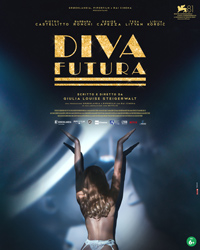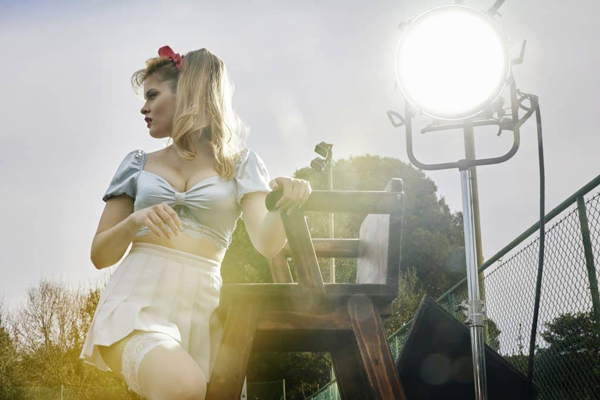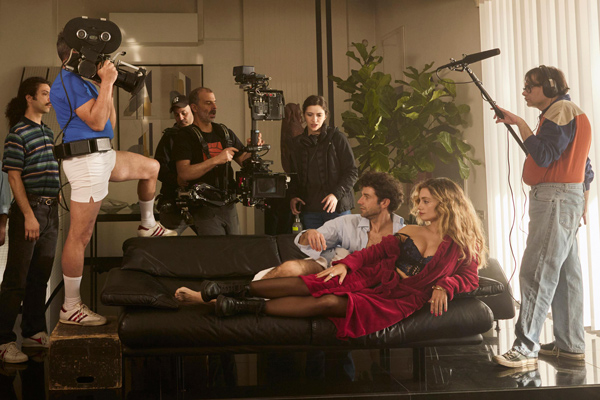Erotic Stagnancy: Steigerwalt’s Depthless Approach of a Italian Porn Heyday
 There’s a formidably compelling subject matter at the heart of Giulia Louise Steigerwalt’s sophomore film Diva Futura, which recuperates the shifting social mores of Italian culture through the wild success of the titular pornography studio established by Riccardo Schicchi. Curating a handful of celebrity personas through his work, two of whom would go on to pursue political careers, this nostalgia tinged approach takes a look at a progressive swing in the country’s conservative rhetoric of the 1990s before the internet changed the game of the industry indefinitely. But this presentation is not the film which succeeds in capturing the movement or its participants. So frantically edited, the zany back-and-forth period changes from 1992 to Schicci’s death in 2012 seem determined to cause whiplash and it’s difficult to ascertain Steigerwalt’s intentions. Initially a light comedy, neither the screenplay nor its key players seem to know when frivolity is supposed to shift gears when personal tragedies, legal backlashes, and a shifting market desiring misogyny becomes apparent.
There’s a formidably compelling subject matter at the heart of Giulia Louise Steigerwalt’s sophomore film Diva Futura, which recuperates the shifting social mores of Italian culture through the wild success of the titular pornography studio established by Riccardo Schicchi. Curating a handful of celebrity personas through his work, two of whom would go on to pursue political careers, this nostalgia tinged approach takes a look at a progressive swing in the country’s conservative rhetoric of the 1990s before the internet changed the game of the industry indefinitely. But this presentation is not the film which succeeds in capturing the movement or its participants. So frantically edited, the zany back-and-forth period changes from 1992 to Schicci’s death in 2012 seem determined to cause whiplash and it’s difficult to ascertain Steigerwalt’s intentions. Initially a light comedy, neither the screenplay nor its key players seem to know when frivolity is supposed to shift gears when personal tragedies, legal backlashes, and a shifting market desiring misogyny becomes apparent.
In 1983, photographer Riccardo Schicchi (Pietro Castellitto) founded the model agency Diva Futuro with his muse Ilona Staller (Lidija Kordic), who became a national sensation known as Cicciolina, thanks in part to their radio talk show Voulez-vous coucher avec moi? and relaxing attitudes towards nudity (she was the first woman to show her breasts on Italian television in 1978). When Cicciolina, who in 1987 became an elected Congressman in Parliament, leaves him for another man, Schicchi expanded his empire with live strip shows and porno films, which featured a number of other women who would become famous for working with him, including Moana Pozzi (Denise Capezza). He would eventually become close with his secretary, Debora Attanasio (Barbara Ronchi), who, besides being responsible for making headlines at the studio, had to tend to the twenty odd cats Schicchi housed in the office. And in 1994, he would marry Eva Hanger (Tesa Litvan), adopting her child from a previous marriage and then having a son with her before she would leave him due to significant issues with jealousy. Eventually, Diva Futuro is raided by police and Schicchi’s strip joints shuttered. He succumbed to complications related to his Type II diabetes in 2012.

While he’s not too far off from the age of the real Schicchi by the time of the film’s starting point in the early 1990s, Pietro Castellitto doesn’t quite conjure the physicality insisted upon by the script beyond his lanky stature. A mop hair do and eventually bloating prosthetics are applied to later periods we zoom in and out of, which makes it difficult to ascertain what’s happening to whom with the bevy of beauties in his stable. The quartet of women we focus on only receive different hairdos, but, yet again, commentary about how they’ve modified themselves as the years go by isn’t something we actually see transpiring. The film’s opening in 1994 shows Schicchi’s pet python receiving a funeral service after the rat intended to be its food chewed a hole into poor Tinta’s head. Later, we’re told this was a metaphorical moment for the changing cultural climate. However, the inept structure distracts and confuses with these correlating details.

Schicchi may be the ringmaster, but he’s the least interesting element of this presentation, and the film often promises to come to life when we disappear into the tangents of the women, particularly Denise Capezza as Moana Pozzi, styled like a 1940s pinup who makes the most considerable effort to take a bite out of the mainstream. With a failed novel and a box office bomb when she tries to break to become a film star of “institutional” cinema, she tries to run successfully for office, twice, her last bid as a right-wing mayoral candidate. Shortly after, she succumbs to liver cancer. Through her struggles, we see the debasing attitudes she’s confronted with in her attempts to grow outside the limiting sphere of porn, and thus becomes, by default, the most well-rounded characterization. Lidija Kordic as Cicciolina, the one who started it all for Schicchi, gets the fuzzy end of the stick despite having the highest profile when she becomes a Congresswoman, yet still performs in her ex’s strip tease club. His Hungarian born wife Eva suffers from having to be in the closest proximity to Schicchi and their rather dull domestic dramas, which leads to run of the mill jealousy issues and a dissolution of their relationship (but not their marriage). Poor Barbara Ronchi gets to play secretary Debora Attanasio, who wrote a book about Diva Futura, sold as the shy one whose hair styles make her a doppelgänger for Greta Scacchi. Try as she might, there’s not one single interesting moment she gets to claim on screen.
In brief, inconsequential bursts, the film tries to negotiate the double standards for women who pursue porn careers and their limited opportunities in divorcing themselves from the inherent stigma following them. While we’re constantly told Schicchi approaches pornography as an erotic art, we never really get to see what that’s supposed to look like other than his actresses engaging in the same kind of glossy nudity we’d see in a Sorrentino film. Thus, it’s unclear what sentiments Diva Futura is aiming for. In this wild, wild west extravaganza of the studio’s heyday, it would seem there was actually limited opportunity for women outside of their close ties to Schicci. Steigerwalt doesn’t try to make any comparisons to the contemporary climate, but it would seem little has changed in an industry which seems more impermanent than ever, and presumably where women are still at the mercy or mood of whatever man’s running the show.
Reviewed on September 4th at the 2024 Venice Film Festival (81st edition) – In Competition section. 128 Minutes.
★/☆☆☆☆☆


